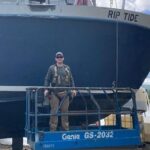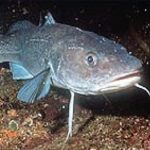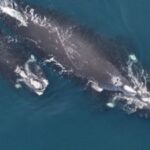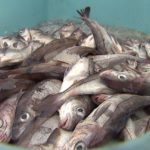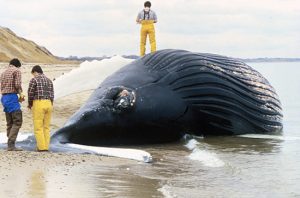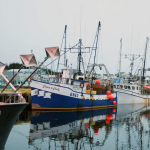Tag Archives: Duncan Fields
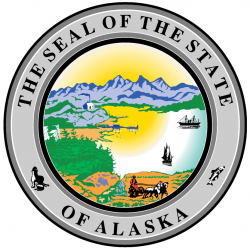
Dunleavy Announces Alaska Bycatch Review Task Force Members
Governor Mike Dunleavy released the list of eleven Alaskans who will serve on the Alaska Bycatch Review Task Force. The mission of the task force is to better understand the unintended bycatch of fish such as halibut and salmon caught in both State and federal waters. The two remaining seats on the task force will be non-voting seats filled by members of the Alaska Legislature. “The 11 Alaskans who stepped forward to serve on the Alaska Bycatch Review Task Force represent key stakeholder groups and are recognized for not only their knowledge of fisheries, but their commitment to sustaining the resource for generations of Alaskans to come.” >click to read< 07:50
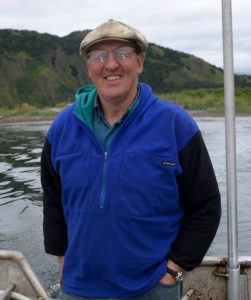
Fields withdraws name from fish board consideration
It was a quick dip into the state fisheries politics pool for Duncan Fields. The Kodiak resident on Wednesday withdrew his name from consideration for the Board of Fisheries, a little less than two weeks after Gov. Bill Walker announced his nomination March 16, according to a press release from Walker’s office. Fields, a commercial salmon fisherman and former member of the North Pacific Fishery Management Council, had become a flashpoint of controversy among sportfishing groups because of his background in commercial fisheries.>click to read<10:47

Board of Fisheries nomination proves controversial
The nomination of a Kodiak-based fisherman to the Alaska Board of Fisheries has led to concern about an overrepresentation of commercial fisheries interests on the board. Governor Bill Walker recently recommended Duncan Fields for the Board of Fisheries to fill the seat left by Anchorage’s Alan Cain, whose term is up this year. Ricky Gease, the executive director of the Kenai River Sport Fishing Association, sees a need for that seat to go to someone with experience in Anchorage-based sports and personal use fishing. >click to read<21:24
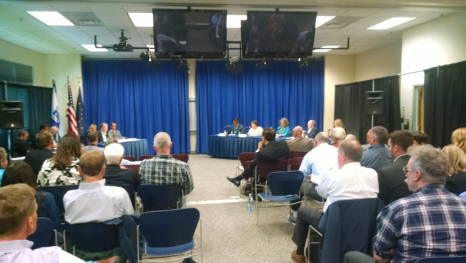
Fish pie – Everyone wants a piece
Representatives of the haves and have-nots of American ocean fisheries gathered in a packed college classroom here on Wednesday to offer Sen. Dan Sullivan, R-Alaska, their ideas on what he could do with the Magnuson-Stevens Fisheries Conservation and Management Act. The now 40-year-old federal fisheries legislation is the legacy of the late and revered Alaska Sen.Ted Stevens.,,, And there is no doubt the MSA has problems when it comes to dealing with recreational fishing. Anglers, charter-boat operators, commercial fishermen and environmental groups are at the moment all in a Gulf of Mexico scrum fighting over red snapper. It is in many ways a tussle that almost makes the long-running fish war in Cook Inlet look tame. click here to read the story 08:25
No Catch Shares! Gulf rationalization dies a quiet death
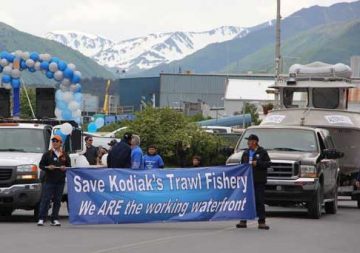 Gulf of Alaska groundfish will remain an open access fishery indefinitely after the North Pacific Fishery Management Council tabled a policy package that has enraged fishermen of all stripes over the last year. Depending on who is asked, the council acted at either its best or its worst with the decision. “The council process didn’t work. They didn’t solve the problem,” said Julie Bonney, executive director of the Groundfish Forum, an industry group of trawlers and processors. “They just took the political part first and ignored the management. I have to keep reminding myself, this isn’t about management. It’s about politics.” Others said the council did exactly what it should have done in the face of so many contentious decisions on which so many people expressed opinions. “I think this is actually the best illustration of council process, rather than the worst,” said Duncan Fields, a Kodiak attorney and former council member who was among the most vocal on this subject. “It shows that one gear group with a particular ideology and particular economic interest with very good advocates can’t just jam something through the council,” he said. “The council allows other participants, small boat fishermen, community, stakeholders to also have a voice, and that voice has said a catch share program is not the best public policy. You don’t always get the result you want.” Read the rest here 20:39
Gulf of Alaska groundfish will remain an open access fishery indefinitely after the North Pacific Fishery Management Council tabled a policy package that has enraged fishermen of all stripes over the last year. Depending on who is asked, the council acted at either its best or its worst with the decision. “The council process didn’t work. They didn’t solve the problem,” said Julie Bonney, executive director of the Groundfish Forum, an industry group of trawlers and processors. “They just took the political part first and ignored the management. I have to keep reminding myself, this isn’t about management. It’s about politics.” Others said the council did exactly what it should have done in the face of so many contentious decisions on which so many people expressed opinions. “I think this is actually the best illustration of council process, rather than the worst,” said Duncan Fields, a Kodiak attorney and former council member who was among the most vocal on this subject. “It shows that one gear group with a particular ideology and particular economic interest with very good advocates can’t just jam something through the council,” he said. “The council allows other participants, small boat fishermen, community, stakeholders to also have a voice, and that voice has said a catch share program is not the best public policy. You don’t always get the result you want.” Read the rest here 20:39




































